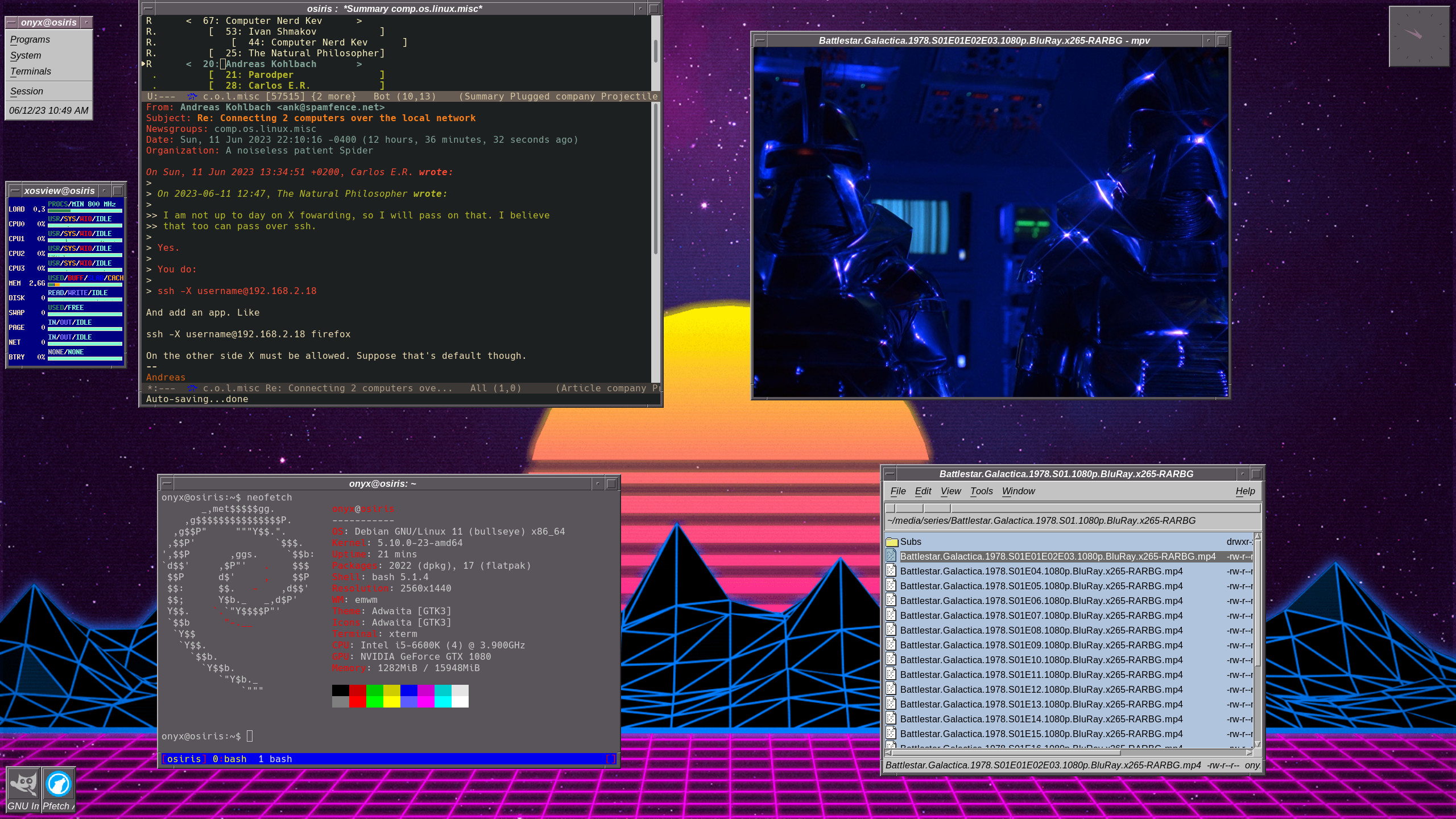arch
Linux
From Wikipedia, the free encyclopedia
Linux is a family of open source Unix-like operating systems based on the Linux kernel, an operating system kernel first released on September 17, 1991 by Linus Torvalds. Linux is typically packaged in a Linux distribution (or distro for short).
Distributions include the Linux kernel and supporting system software and libraries, many of which are provided by the GNU Project. Many Linux distributions use the word "Linux" in their name, but the Free Software Foundation uses the name GNU/Linux to emphasize the importance of GNU software, causing some controversy.
Rules
- Posts must be relevant to operating systems running the Linux kernel. GNU/Linux or otherwise.
- No misinformation
- No NSFW content
- No hate speech, bigotry, etc
Related Communities
Community icon by Alpár-Etele Méder, licensed under CC BY 3.0
Slackware
I use Debian with a patched version of motif window manager. The 90s never ended:

Manjaro for the best 🥰
Manjaro + SteamOS. Wanted to refresh myself on gaming with Linux/Proton prior to the Deck launch and Manjaro seemed the most similar. Helped that my Win11 install decided to crash explorer.exe every 5 seconds around the same time.
Does SteamOS count? My steam deck is my current “Linux” machine.
I have a few dozen computers and most run Pop!_OS.
I use Arch Linux with KDE Plasma myself
I use Manjaro, but I run it like vanilla Arch (for example pacman/yay and not pamac). I find this to be a sweet spot for me - rolling releases are so incredibly nice, and Manjaro being slightly slower than Arch is good from a stability standpoint in my experience.
I use ZFS all over the place, including the root storage pool on my home server, which has overall been a great experience with systemd-boot.
Linux Mint with Mate DE.
I've been a daily fedora user for the half year. Initially I started off with ElementaryOS but it was so filled with bugs, and glitches, so it didnt last for more than a couple of months. While the fedora experience is way more streamlined.
NixOS everywhere (except for one server which I have yet to migrate from Rocky to NixOS)
I use opensuse with kde and I love it. Have been using it for 2 years now.
For server use at home I use Ubuntu Server and Alma Linux (mostly)
At work it is all RedHat.
Ubuntu for life. Unpopular opinion i know, please don't stone.
KDE Neon on desktop. I want to be on the latest Wayland I can for feature support (and Waydroid), without being on the bleeding edge for stability, and it checks all those boxes. Based on Ubuntu LTS, with latest Wayland and KDE software.
For my home servers I like to try out different distros. I have a thin client on openSUSE Tumbleweed running Portainer, a couple Armbian SBCs for reverse proxies, my main Unraid storage server, and a thin client running NixOS at my parents' house for backup storage and remote troubleshooting access.
Manjaro. I am a guy of habits, so I never really distro-hopped, I once tried to install Arch and failed to configure everything so I tried endeavour and failed too (which would mean I am not a tech guy either ;). Ultimately, I'd say that the distribution does not matters much once you are used to it, you can always get what you want from any of them. The only thing I really like in comparison with others is pacman :)
My laptop is on Manjaro and has been running flawlessly for years ...such a great experience with gnome 40+
My desktop is also on Manjaro, and things could not be more different. No Wayland, no animations in the gnome desktop, visual glitches since the last update ...guess it doesn't play well with Nvidia drivers. Anyone managing something decent with gnome+Nvidia?
Moved from Arch to Nix and loving it!
What do you most like? Thoughts on why others should give it a shot?
NixOS. Declarative config with opt-in state is awesome.
Same here. It's made my life a whole lot easier since on previous distros, I had to depend on documenting manual hacks I had done.
Fellow NixOS traveller. I used Nix for work and never saw the appeal of a whole OA built around it but when I saw a tutorial with the declarative config I was instantly sold.
Currently... Slackware on main laptop. Slint (Slackware-based) on mini-pc. MX Linux (fvwm respin), Void, and OpenBSD on old laptop. NsCDE is desktop on all except MX.
I love to see Slackware representation in these threads, easily my favorite distribution of all time.
I've gotten used to Slackware in 25 years.
I use ArchLinux with AUR and flatpak.
It's just perfect for my potato laptop.
I used to use Void as my main distro, but then the developer drama made me shy away from it (keep in mind, this was like forever ago and I haven’t looked at Void at all since). After that I floated around trying everything, from Gentoo to the BSDs (I know, not Linux). Nowadays I use OpenSUSE Tumbleweed. I got tired of doing everything manually and OpenSUSE just makes everything so much easier to use, IMO.
I got tired of doing everything manually
Perhaps check out NixOS
Arch
I find that bugs in linux programs (and they will happen regardless of distro) are more easily tweaked in systems that do minimal modifications to upstream programs and keep them updated regularly with what the developers release
Also AUR makes it easy to install pretty much anything without having to add ppas, new repo links, etc